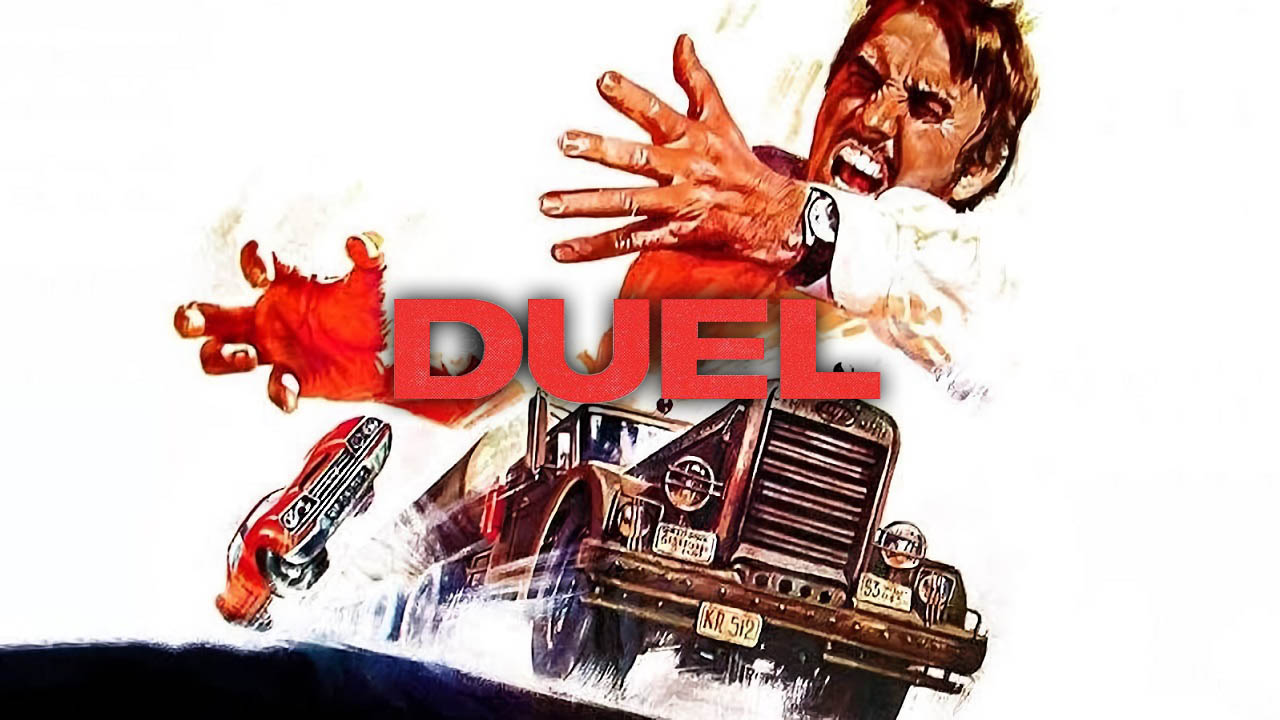Before Steven Spielberg revolutionized Hollywood’s model by establishing the “blockbuster” with Jaws (1975), he honed his craft as a TV director for shows like Night Gallery and Columbo. Cutting his teeth on these productions allowed him to refine his filmmaking techniques, and by all accounts, he showed immense promise from the outset of his career.
Spielberg’s talent was so evident that Universal offered him a deal to direct several TV movies. His first attempt, Duel, proved to be a massive success. It was so impressive that it was given a theatrical run for the international market, receiving an improved edit tailored for a theatrical experience.
The theatrical version of Duel now stands as Spielberg’s first feature film, the stepping stone to his blockbuster revolution with Jaws. It paved the way for bigger budgets and grander visions, but it also showcased the raw talent that Spielberg possessed even with limited resources. What is Duel about, how does it hold up today, and what can viewers expect from the new 4K transfer?
Duel (1971)
Production Company: Universal Television
Distributor: Universal
Director: Steven Spielberg
Release Date: November 13, 1971
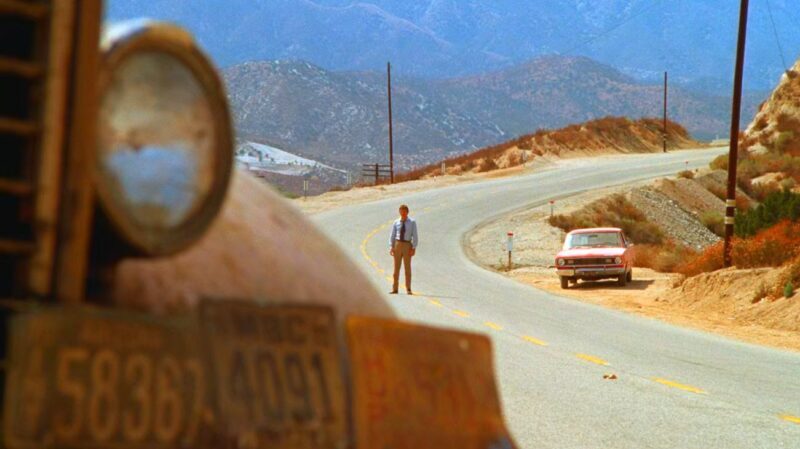
The sun hung low over the California asphalt, baking the air into a simmering mirage. Dust devils danced across the cracked highway, and the only sound was the whine of David Mann’s tires against the blacktop. Mann, a salesman built for beige cubicles and lukewarm coffee, was sweating through his polyester suit.
He drummed his fingers on the steering wheel, the monotony of the road gnawing at his sanity. Then, a flicker on the horizon. A rusty tanker truck, a leviathan of rust and diesel fumes, lumbered into view. It wasn’t just any Peterbilt, though. This one has a presence, a malevolent aura that crawled up Mann’s spine like a tarantula.
A chipped tooth of a grill, multiple license plates on its front bumper, and a paint job that hadn’t seen a lick of sunshine since Nixon was president. Maybe it was the heat, maybe it was the existential dread that comes with being a small fish in a big desert, but Mann does something stupid. He passes the truck. It was like poking a sleeping rattlesnake with a rolled-up newspaper.
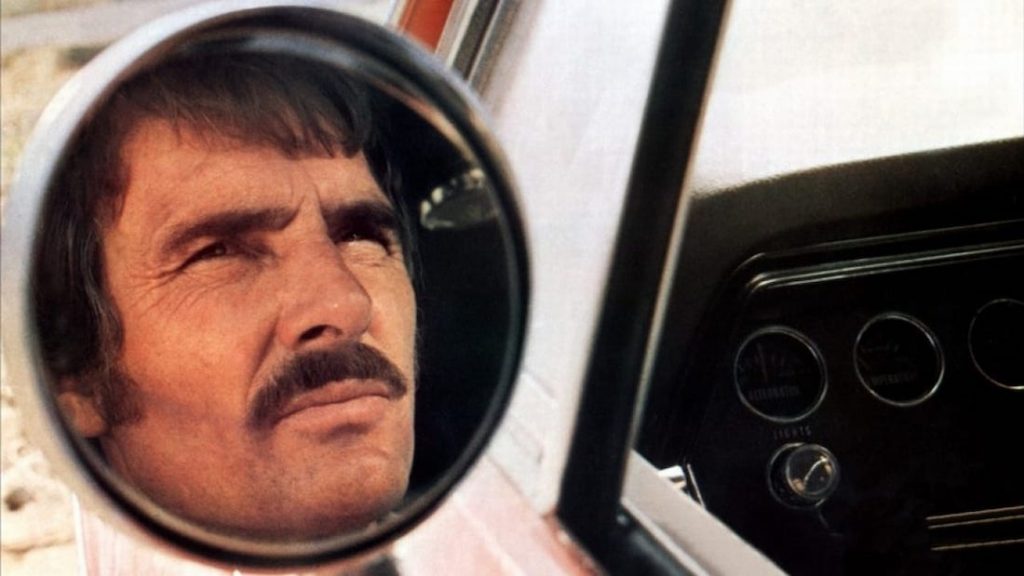
The horn blared, a banshee wail that shattered the desert silence. The truck lurched forward, its rusty breath hot on Mann’s bumper. A game of cat and mouse had begun, only this cat had a chrome grille and a trunk full of diesel fury.
Mann stomped on the gas, the Plymouth Valiant groaning under the strain. The truck kept pace, its shadow a hungry maw swallowing the sun-baked road. Every mile marker became a taunting grin, every passing vehicle a potential savior that turned away in a cloud of dust.
The desert, once a vast, empty canvas, became a wall-less labyrinthine purgatory. The sun, a relentless warden, beat down on the chase. Sweat stinging, his knuckles white on the steering wheel. He was trapped in a steel and rubber ballet of terror, the only music the screech of tires and the thrumming of his own racing heart.
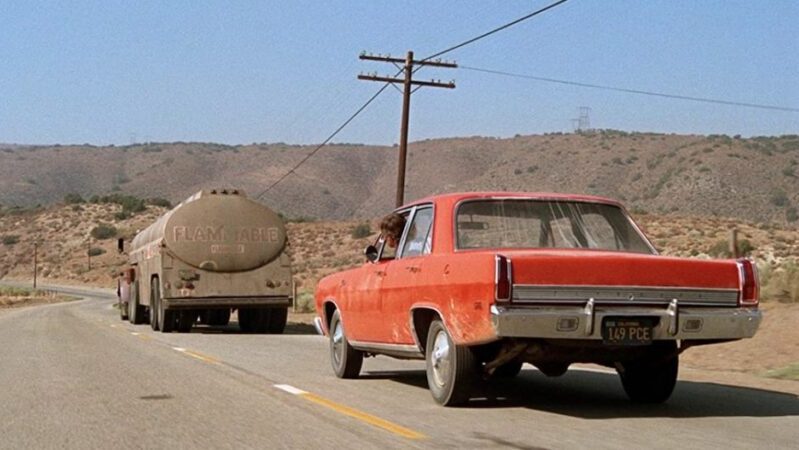
Mann wasn’t just a salesman anymore. The desert sun had baked away his beige exterior, revealing a core of something hard and desperate. He started thinking, not as a guy who moved plastic spatulas, but as a creature fighting for survival.
David Mann embodies the anxieties of a generation grappling with the shifting sands of masculinity. His plain red Plymouth Valiant, a rolling metaphor for his unassuming life, is dwarfed by the hulking, rusty tanker truck that becomes his tormentor.
The film is Spielberg’s nuanced exploration of masculinity in flux, a slow burn that reveals the anxieties simmering beneath David’s seemingly calm exterior. This is echoed in the radio call show he listens to, where a stay-at-home father grapples with societal expectations and his wife’s success.
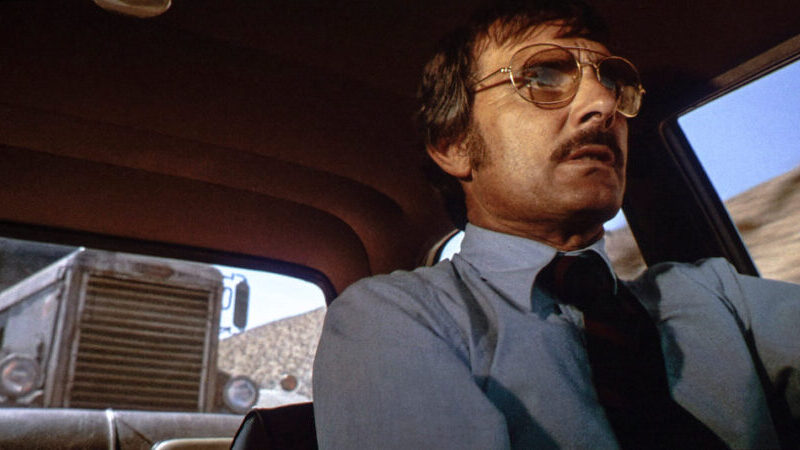
David’s wife expresses her frustration with his inaction when they discuss the previous night’s events, where a guest assaulted her at a party. David struggles to assert himself in the situation, leaving both him and his wife feeling unheard and unsupported.
Duel is a relentless and tense story told very effectively. Spielberg masterfully builds the suspense gradually, allowing the audience to become increasingly invested in David’s plight. The chase starts slowly, with the trucker’s presence growing more menacing with each passing mile. This gradual escalation of tension keeps the audience on the edge of their seats, anticipating the next unpredictable move from the trucker.
Dennis Weaver as David Mann bears the weight of the entire film, appearing in every scene and convincingly portraying his character’s unraveling. Unfortunately, the film’s only weakness is some unnecessary sequences of Mann having some pointless inner monologues. The scenes are just as effective without these jarring narrations and are a sign of the filmmakers having a lapse of confidence in the audience.
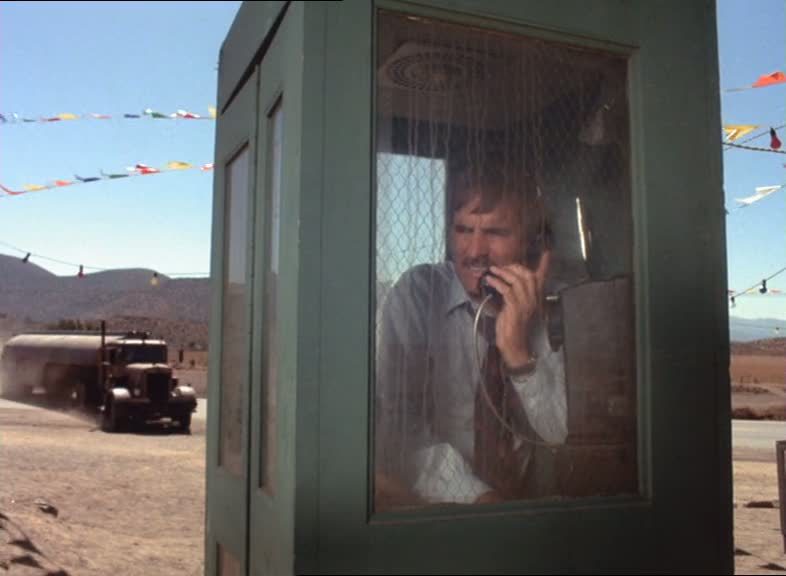
The trucker’s anonymity and silence add an eerie and unsettling dimension to the chase. We never see his face or hear his voice, making him an enigmatic force that David cannot fully comprehend.
This ambiguity amplifies the sense of threat and danger, as the trucker could be anyone or anything lurking behind the truck’s imposing façade. The truck is a metaphor, an abstract demon, and the film also briefly entertains the possibility that it might be a manifestation of David’s inner turmoil.
The truck can be all these things and more, which demonstrates how powerful Duel is despite its simplicity. It invites multiple interpretations and leaves room for the audience to draw their own conclusions.
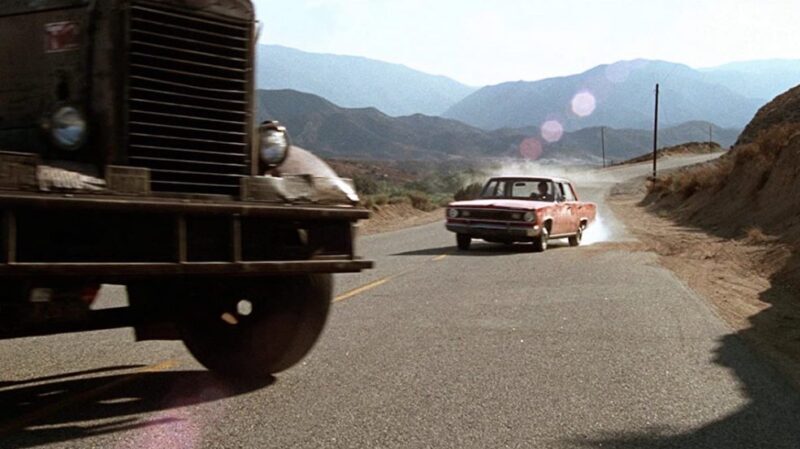
Duel was shot on 35mm, with a 1.85:1 aspect ratio for the theatrical release. This new transfer has been seemingly sourced from the camera negatives and it pays off big time because this film never looked so good. Every speck of filth is legible on the truck. Every line and drop of sweat is finely pronounced on Dennis Weaver’s head.
The new HDR/DV transfer enhances the clear blue California skies, adding depth and improving the flesh tones on the cast, giving everyone a more natural appearance. Impressively, the transfer is free of dirt, debris, or artifacts, resulting in a clean and dazzling presentation. The only drawback is that the increased clarity and definition may make some out-of-focus shots more noticeable.
This 4K release of Duel delivers an immersive Dolby Atmos (TrueHD core) soundscape. The results are undeniably powerful and engrossing. The tunnel sequences are particularly impactful, with the roaring sound of the truck or the Valiant rushing by, making the chase feel like it’s unfolding right in your living room.
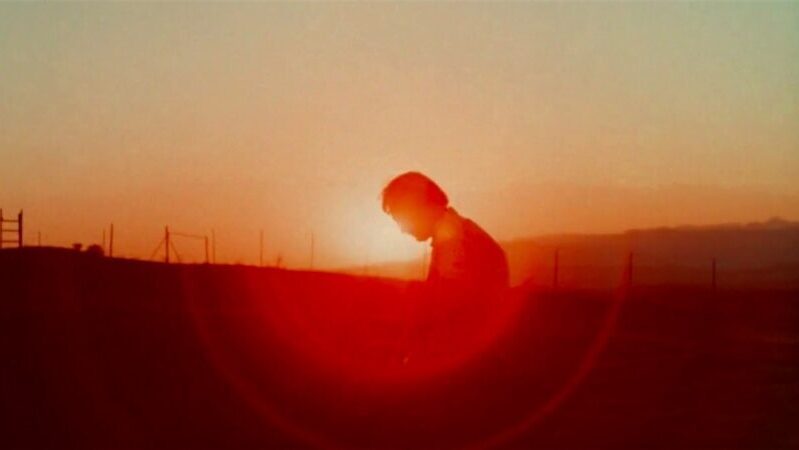
Duel is a masterclass in suspense, a cinematic tightrope walk that Spielberg navigates with the finesse of a seasoned acrobat. The tension is palpable, the atmosphere thick with dread, and the sense of impending doom is inescapable.
The new 4K release from Universal breathes new life into this cinematic gem, delivering a stunning transfer that showcases Spielberg’s masterful camerawork and the film’s gritty, evocative aesthetic. The grain resolution is improved, the detail presentation is enhanced, and the color grading is spot-on, capturing the film’s desert hues and the oppressive atmosphere with stunning clarity.
If you’re looking for a film that will have you on the edge of your seat, a film that will pump your adrenaline and leave you craving more, then look no further than Duel. It’s a lean, mean, cinematic machine that will leave you breathless and begging for more.
Duel was reviewed with a 4K Bluray purchased by Niche Gamer. You can find additional information about Niche Gamer’s review/ethics policy here. Duel is now available on 4K Bluray at retailers.
